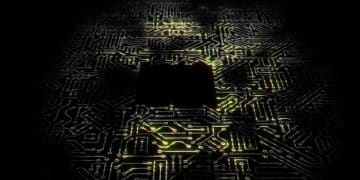Understanding NFTs: Beyond Digital Art

NFTs, or non-fungible tokens, are unique digital assets on a blockchain, revolutionizing ownership in various industries including art, gaming, and real estate by ensuring verifiable authenticity and secure transactions.
Understanding NFTs is essential in today’s digital landscape. These unique tokens challenge our concept of ownership and value, extending far beyond digital art. Let’s dive into this fascinating world.
What are NFTs and how do they work?
NFTs, or non-fungible tokens, are unique digital assets that stand apart from traditional cryptocurrencies like Bitcoin. Each NFT is verified on a blockchain, which ensures its authenticity and ownership.
For those new to the concept, it’s crucial to understand what makes NFTs different. Unlike fungible tokens, which are interchangeable, NFTs are one-of-a-kind. This uniqueness allows them to represent not just digital art, but also music, games, virtual real estate, and more.
How NFTs Function
NFTs operate using smart contracts on a blockchain, most commonly Ethereum. These contracts outline ownership, transfer rights, and other details. Whenever an NFT changes hands, the transaction is recorded on the blockchain, providing a permanent and verifiable record.
- Smart contracts automate transactions, making them secure.
- Blockchain technology guarantees authenticity.
- Owners can resell NFTs easily through various marketplaces.
- NFTs can include royalty features, allowing creators to earn every time their work is sold.
The rise of NFTs has opened new avenues for artists and creators to monetize their work. For example, artists can now sell their digital paintings directly to consumers, eliminating middlemen. Additionally, the scarcity created by NFTs drives demand, as collectors seek unique items.
Moreover, the community around NFTs is robust, with platforms like OpenSea and Rarible enabling users to buy, sell, and create their own NFTs. This aspect provides a sense of ownership and connection that traditional art markets often lack.
The Importance of Ownership
One of the main appeals of NFTs is the concept of ownership. With an NFT, you have proof that you own a specific item, even if others can view it. This distinction is vital in the digital age, where reproducing digital content is easy.
In conclusion, NFTs are revolutionizing the way we think about ownership and value in the digital world. Understanding how they work is the first step in navigating this new landscape.
The evolution of NFTs beyond art

The evolution of NFTs has dramatically expanded the horizons of what these digital tokens can represent. While they initially gained fame for enabling the sale of digital art, their applications have grown to encompass various sectors.
Beyond art, NFTs now play crucial roles in gaming, music, and even real estate. With blockchain as their foundation, these tokens provide secure and verifiable ownership that helps reshape traditional markets.
Applications of NFTs
In the gaming industry, NFTs allow players to own unique in-game items. Each item, whether a weapon or a character skin, is an NFT, making it tradable and valuable. This shift empowers players as they can actually own their assets.
- Players can buy, sell, and trade items freely.
- New models for monetization emerge from virtual economies.
- Game developers can create rewarding ecosystems for users.
- Limited edition items drive demand and retain player interest.
Meanwhile, in music, artists are using NFTs to sell special editions of their tracks. Fans can own something rare and potentially valuable, unlocking unique experiences like private concerts or exclusive content. Additionally, musicians can release albums directly as NFTs, keeping more profit compared to traditional sales models.
NFTs in Real Estate
The real estate market is also beginning to grasp the potential of NFTs. Property ownership can be represented as an NFT, which streamlines the buying and selling process. This eliminates the need for extensive paperwork and allows quick verification of ownership.
The transaction transparency provided by NFTs builds trust among buyers and sellers. Imagine buying a home where ownership is transferred with a simple digital signature, all thanks to blockchain technology.
Ultimately, the journey of NFTs is just beginning. As new use cases emerge, the question remains: what will be the next frontier of NFT innovation? Continuing to witness this evolution will be exciting as it shapes our digital future.
Applications of NFTs in various industries
The applications of NFTs span across various industries, showcasing their versatility and innovative potential. From entertainment to sports and beyond, these digital tokens are changing how we interact with content and ownership.
In the entertainment industry, NFTs have opened new doors for artists and creators. Musicians are now selling exclusive tracks directly to fans as NFTs. This method enhances fan engagement while allowing artists to retain more profits than traditional distribution methods.
NFTs in Gaming
Gaming is another sector experiencing a transformative impact from NFTs. Players can own unique in-game items, which can be bought, sold, or traded in a decentralized marketplace. This kind of ownership creates a more committed community. Players feel a sense of investment and attachment to their assets.
- Players have the freedom to trade or sell their rare items.
- Games can incorporate NFTs to enhance player experiences.
- Developers can monetize their games through unique collectibles.
- Exclusive content can be unlocked via NFT ownership.
Furthermore, in the sports world, NFTs are gaining traction as teams and athletes release collectible memorabilia as digital assets. Fans can own a piece of history, such as a moment from a game or a digital trading card featuring their favorite player.
Real Estate and NFTs
The real estate industry is also starting to experiment with NFTs. Properties can be tokenized, allowing for a seamless transfer of ownership. This method reduces the need for intermediaries and streamlines transactions, making buying and selling properties faster and more efficient.
The entertainment and sports markets are leveraging NFTs to introduce loyalty programs and fan engagement initiatives. Fans can access exclusive events or merchandise by holding specific NFTs. This innovative approach creates a deeper bond between fans and their favorite teams or artists.
As the technology evolves, we may see even more applications in finance, identity verification, and charity. The use of NFTs could redefine how we understand ownership and value across different sectors.
Challenges and misconceptions about NFTs

Despite the popularity of NFTs, many challenges and misconceptions surround this technology. Understanding these issues is key to navigating the NFT landscape successfully.
One major misconception is that NFTs are just a trend. While it may seem that way, the underlying blockchain technology offers lasting value by creating verifiable ownership. This aspect extends beyond digital art and gaming to include music, sports, and real estate.
Common Challenges in the NFT Space
Another challenge is the environmental impact of NFTs. The energy consumption of blockchain technology, particularly Ethereum, raises concerns about its sustainability. As interest grows in NFTs, so does the push for more eco-friendly solutions and alternatives to traditional methods.
- High energy consumption due to mining processes.
- Efforts to move towards more sustainable blockchain technologies.
- Increasing public awareness of environmental issues related to NFTs.
- Developers looking for solutions to minimize carbon footprints.
Additionally, people may worry about the volatility of NFT prices. Prices can fluctuate greatly, leading to concerns about investing in such assets. It’s crucial for potential buyers to conduct thorough research before entering the market.
Legal and Copyright Issues
Legal considerations also pose challenges. Questions about copyright and ownership rights in the NFT space can be complicated. Many creators assume owning an NFT grants full ownership, but it typically only provides rights to the token rather than the underlying work. Understanding these nuances is essential.
Furthermore, the surge of fraudulent NFTs complicates the landscape. Buyers might encounter counterfeit tokens or scams, highlighting the need for caution when engaging in NFT transactions. Verifying authenticity through reputable marketplaces can help mitigate risks.
Overall, addressing these challenges and misconceptions about NFTs can enhance understanding and promote responsible engagement in this evolving digital ecosystem.
The future of NFTs and digital ownership
The future of NFTs and digital ownership looks promising and full of potential. As technology evolves, we may see greater integration of NFTs in various aspects of our daily lives. This evolution could redefine how we understand ownership in the digital world.
One key area of growth is the increase in utility for NFTs. Beyond just collectibles, NFTs may serve practical purposes. For instance, they can represent ownership of real estate, tickets to events, or access to exclusive content. This expanded utility gives NFTs a functional role that could enhance their value and appeal.
Advancements in Technology
As blockchain technology improves, we can expect faster transactions and lower fees associated with NFTs. The switch to more eco-friendly blockchain solutions may also help address some environmental concerns, making NFTs a more sustainable option. The development of Layer 2 solutions and new protocols could further ease user access and engagement.
- Broader adoption in various industries like music, art, and gaming.
- Improved security and verification methods for authenticity.
- Integration with virtual and augmented reality experiences.
- Facilitation of decentralized finance (DeFi) opportunities.
Moreover, the legal framework surrounding NFTs will likely evolve so that there are clearer guidelines about copyright and ownership rights. This clarity can help protect creators and buyers while encouraging innovative uses of NFTs. As people become more educated about digital ownership, increased participation in the NFT space is expected.
Engagement and Community Building
Communities built around NFTs will also play a significant role in shaping their future. Social tokens, which enable creators to engage directly with their audiences, could become more common. This direct engagement will promote a sense of belonging, loyalty, and shared ownership among fans.
The blend of NFTs and social experiences may lead to unique collaborations and partnerships, creating opportunities for artists, brands, and fans alike. Overall, the future of NFTs is about expanding their reach and enhancing their significance in digital ownership.
FAQ – Frequently Asked Questions About NFTs and Digital Ownership
What are NFTs and how do they work?
NFTs, or non-fungible tokens, are unique digital assets that represent ownership on a blockchain, creating verifiable authenticity.
What industries are using NFTs?
NFTs are being utilized in industries such as art, music, gaming, and real estate, offering new opportunities for creators and consumers.
What are the environmental concerns associated with NFTs?
NFTs can be energy-intensive due to blockchain technology, but efforts are being made to develop more sustainable and eco-friendly alternatives.
How do legal issues affect NFTs?
Legal considerations, such as copyright and ownership rights, are important as they can impact creators and buyers in the NFT marketplace.





